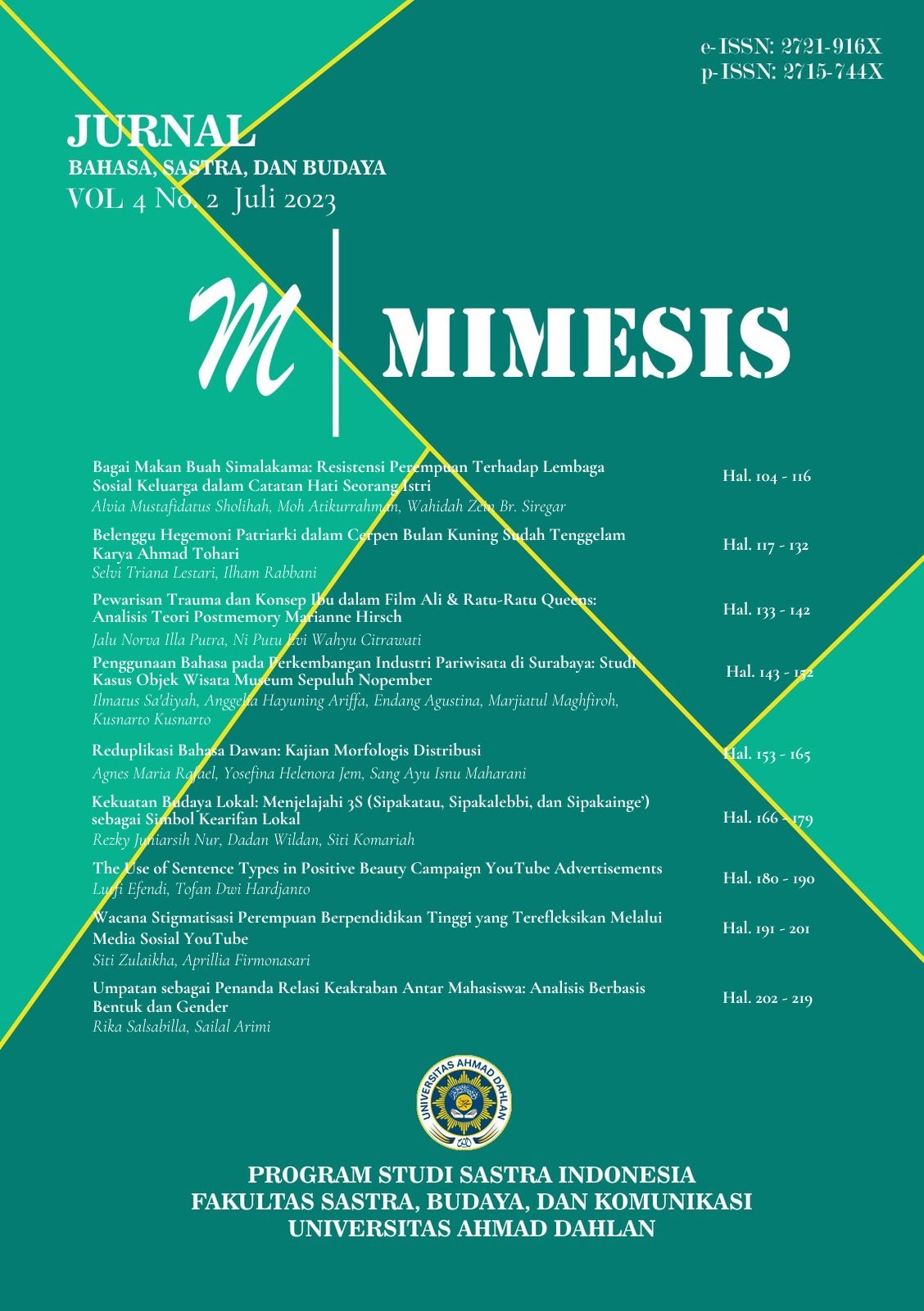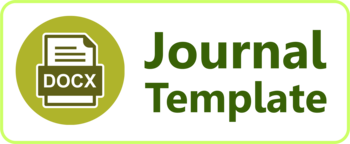Penggunaan Bahasa pada Perkembangan Industri Pariwisata di Surabaya: Studi Kasus Objek Wisata Museum Sepuluh Nopember
DOI:
https://doi.org/10.12928/mms.v4i2.8072Keywords:
Indonesian Language, Language Usage, Museum Sepuluh Nopember, Tourism IndustryAbstract
The tourism industry in Surabaya has had to adapt to the changing times marked by the entry of foreign languages into Indonesia. The phenomenon of the use of foreign languages in public spaces is often a problem. For that reason, this article was written based on research conducted to analyze the use of language and writing skills in Indonesian and foreign languages in one of the branches of tourism in Surabaya, namely Museum Sepuluh Nopember. This research is qualitative descriptive in nature using primary data from direct data sources, namely the utilization of indonesian in the tourism industry of Museum Sepuluh Nopember Surabaya. Data collection is done by documentation and observation method. In addition, the analytical method used is descriptive qualitative. Based on the analysis that has been done, the use of Indonesian in the Museum Sepuluh Nopember Surabaya tourism industry is not optimal. There are still several formats for the using and spelling of Indonesian and foreign languages that need to be corrected according to regulations of language institutions and the law on language use.
References
Arsanti, M. & Setiana, L.N. (2020). Pudarnya Pesona Bahasa Indonesia di Media Sosial (Sebuah Kajian Sosiolinguistik Penggunaan Bahasa Indonesia). Lingua Franca, 4(1), 1-12, http://dx.doi.org/10.30651/lf.v4i1.4314
Atmoko, T.P.H. (2014). Strategi Pengembangan Potensi Desa Wisata Brajan Kabupaten Sleman. Media Wisata, 12(2), 146-154, https://doi.org/10.36276/mws.v12i2.209
Diana, P.N., dkk. (2022). Pendampingan Labelisasi Lanskap Linguistik Multilingual Destinasi Wisata Bangkalan di Era New Normal. Jurnal Ilmiah Pengabdhi, 8(1), 28-33, https://doi.org/10.21107/pangabdhi.v8i1.13543
Fatmahwati, A, F. A. (2019). Penggunaan Bahasa Indonesia Pada Media Ruang Publik Di Kota Pekanbaru. Suar Betang, 13(2), 131–144. https://doi.org/10.26499/surbet.v13i2.76
Hartawan, R.F.C. (2023). Bahasa Indonesia untuk Perguruan Tinggi. Malang: Literasi Nusantara.
Hasanah, H. (n.d.). TEKNIK-TEKNIK OBSERVASI (Sebuah Alternatif Metode Pengumpulan Data Kualitatif Ilmu-ilmu Sosial). Jurnal at-Taqaddum, 8(1), 21-46
Kusumawati, T.I. (2018). Peranan Bahasa Indonesia dalam Era Globalisasi. Jurnal Nizhamiyah, 8(2), 68-77, http://dx.doi.org/10.30821/niz.v8i2.396
Purba, H. & Irwansyah, I. (2022). User Generated Content dan Pemanfaatan Media Sosial dalam Perkembangan Industri Pariwisata: Literature Review. Profesional: Jurnal Komunikasi & Administrasi Publik, 9(2), 229-238
Prabhawati, A. (2018). Upaya Indonesia dalam Meningkatkan Kualitas Pariwisata Budaya melalui Diplomasi Kebudayaan. Journal of Tourism and Creativity, 2(2), 158-177, https://doi.org/10.19184/jtc.v2i2.13847
Salamah, W. (2020). Deskripsi Penggunaan Aplikasi Google Classroom dalam Proses Pembelajaran. Jurnal Penelitian dan Pengembangan Pendidikan, 4(3), 533-538
Sutarma, I.G.P & Sadia, I. K. (2013). Penggunaan Bahasa Indonesia di Industri Pariwisata: Studi Kasus Perencanaan Bahasa pada Industri Pariwisata Bali. SOSHUM. Jurnal Sosial dan Humaniora, 3(2), 202–211.
Kemdikbud, P. W. (2017, Desember 20). Utamakan Bahasa Indonesia, Lestarikan Bahasa Daerah, dan Kuasai Bahasa Asing. Retrieved from Kementerian: https://www.kemdikbud.go.id/main/blog/2017/12/utamakan-bahasa-indonesia-lestarikan- bahasa-daerah-dan-kuasai-bahasa-asing
Downloads
Published
Issue
Section
License
Copyright (c) 2023 Ilmatus Sa'diyah, Anggelia Hayuning Ariffa, Endang Agustina, Marjiatul Maghfiroh, Kusnarto

This work is licensed under a Creative Commons Attribution-ShareAlike 4.0 International License.
License and Copyright Agreement
In submitting the manuscript to the journal, the authors certify that:
- They are authorized by their co-authors to enter into these arrangements.
- The work described has not been formally published before, except in the form of an abstract or as part of a published lecture, review, thesis, or overlay journal.
- That it is not under consideration for publication elsewhere,
- That its publication has been approved by all the author(s) and by the responsible authorities tacitly or explicitly of the institutes where the work has been carried out.
- They secure the right to reproduce any material that has already been published or copyrighted elsewhere.
- They agree to the following license and copyright agreement.
Copyright
Authors who publish with Mimesis agree to the following terms:
- Authors retain copyright and grant the journal right of first publication with the work simultaneously licensed under a Creative Commons Attribution License (CC BY-SA 4.0) that allows others to share the work with an acknowledgment of the work's authorship and initial publication in this journal.
- Authors are able to enter into separate, additional contractual arrangements for the non-exclusive distribution of the journal's published version of the work (e.g., post it to an institutional repository or publish it in a book), with an acknowledgment of its initial publication in this journal.
- Authors are permitted and encouraged to post their work online (e.g., in institutional repositories or on their website) prior to and during the submission process, as it can lead to productive exchanges, as well as earlier and greater citation of published work.












